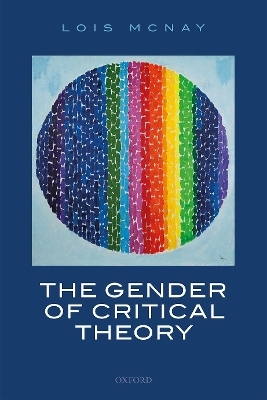
The Gender of Critical Theory
On the Experiential Grounds of Critique
Seiten
2022
Oxford University Press (Verlag)
978-0-19-885775-4 (ISBN)
Oxford University Press (Verlag)
978-0-19-885775-4 (ISBN)
A major new contribution to the Frankfurt School of critical theory drawing on feminist work on gender.
Frankfurt School Critical Theory describes itself as an unmasking critique of power. However, it has surprisingly little to say about major structural oppressions, including gender. A distinctive feature of critique is that, in diagnosing what is wrong with the world, it ought to be guided by the experiences of oppressed groups. Yet, in practice, it tends to pay little heed to these experiences. The Gender of Critical Theory shows how these oversights and tensions stem from the preoccupation with normative foundations that has dominated Frankfurt School theory since Habermas and has given rise to a mode of paradigm-led inquiry that undermines an effective critique of oppression. The assumption of paradigm-led inquiry that too strong a focus on lived experience has parochializing effects on theory stands in tension with its other tenet that emancipatory critique ought to be primarily concerned with the situation of oppressed groups. To alleviate this tension, this book offers a reconfigured account of context-transcendence as the critical insight afforded not by a monist interpretative paradigm but by reasoning dialogically across experiential and theoretical perspectives. By bringing feminist work on gender to bear on Frankfurt School critical theory, it argues that, far from stymying emancipatory critique, attentiveness to the experiences of oppressed groups is one of its enabling conditions. Lived experience can reveal dimensions to oppression that are not necessarily visible from the external vantage point of the theorist. The ways in which vulnerable groups respond to their circumstances may also make an invaluable contribution to the development of models of transformative social practice. Combining feminist ideas with inherent but underutilised resources in the Frankfurt School tradition, this book proposes the idea of critique as theorising from experience.
Frankfurt School Critical Theory describes itself as an unmasking critique of power. However, it has surprisingly little to say about major structural oppressions, including gender. A distinctive feature of critique is that, in diagnosing what is wrong with the world, it ought to be guided by the experiences of oppressed groups. Yet, in practice, it tends to pay little heed to these experiences. The Gender of Critical Theory shows how these oversights and tensions stem from the preoccupation with normative foundations that has dominated Frankfurt School theory since Habermas and has given rise to a mode of paradigm-led inquiry that undermines an effective critique of oppression. The assumption of paradigm-led inquiry that too strong a focus on lived experience has parochializing effects on theory stands in tension with its other tenet that emancipatory critique ought to be primarily concerned with the situation of oppressed groups. To alleviate this tension, this book offers a reconfigured account of context-transcendence as the critical insight afforded not by a monist interpretative paradigm but by reasoning dialogically across experiential and theoretical perspectives. By bringing feminist work on gender to bear on Frankfurt School critical theory, it argues that, far from stymying emancipatory critique, attentiveness to the experiences of oppressed groups is one of its enabling conditions. Lived experience can reveal dimensions to oppression that are not necessarily visible from the external vantage point of the theorist. The ways in which vulnerable groups respond to their circumstances may also make an invaluable contribution to the development of models of transformative social practice. Combining feminist ideas with inherent but underutilised resources in the Frankfurt School tradition, this book proposes the idea of critique as theorising from experience.
Lois McNay is Professor of the Theory of Politics at the University of Oxford and Fellow of Somerville College. She works on French and German critical theory and its intersections with feminist ideas of gender. Her previous books include: Foucault and Feminism (Polity 1992), Gender and Agency (Polity 2000), Against Recognition (2008) and The Misguided Search for the Political (2014).
Introduction
1: Unmasking Power: Experience, Gender and Oppression
2: Experience at the Limits of Justification
3: Recognition and Progress in the Family
4: The Politics of Disclosure
5: Critique and the 'Merely Experienced'
6: The Incompatibility of Formalism and Negativism
Conclusion: Theorising from Experience
| Erscheinungsdatum | 21.04.2022 |
|---|---|
| Verlagsort | Oxford |
| Sprache | englisch |
| Maße | 155 x 234 mm |
| Gewicht | 442 g |
| Themenwelt | Sozialwissenschaften ► Politik / Verwaltung ► Politische Theorie |
| Sozialwissenschaften ► Soziologie ► Gender Studies | |
| ISBN-10 | 0-19-885775-6 / 0198857756 |
| ISBN-13 | 978-0-19-885775-4 / 9780198857754 |
| Zustand | Neuware |
| Haben Sie eine Frage zum Produkt? |
Mehr entdecken
aus dem Bereich
aus dem Bereich
ein Vortrag
Buch | Softcover (2024)
Suhrkamp (Verlag)
CHF 13,95
Geschichte, Vordenker, Organisationen
Buch | Softcover (2023)
C.H.Beck (Verlag)
CHF 18,90


